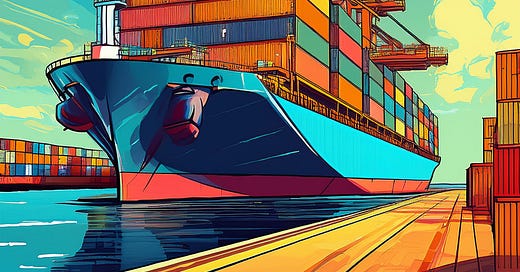Tariffs have been nonstop in the news, so I figured I should talk about them. BUT instead of injecting my own views, I’ve decided to present both sides of the debate below.
Will tariffs hurt the U.S. economy?
Yes… unless the country enacts some sort of industrial policy to promote manufacturing in America.
In a piece from Brown University, Professor of Economics Şebnem Kalemli-Özcan argued:
“imposing tariffs… [will not] benefit [Americans]… unless at the same time the country… promote[s] manufacturing…”
So, potentially, there’s a lot of pain coming. The economist explains:
Americans usually buy foreign goods either because they’re cheaper or they’re of better quality than a version made here. If you were to make all of these foreign goods more expensive for all Americans but you don’t want to hurt Americans, you’d have to use the revenue generated from the tariff to subsidize a lot of American companies making the exact same thing. This tariff revenue will not be enough for that. Also, this would have to happen right away, and you’d have to make sure that the American product is the same quality or better than the foreign-made good and still offered at a low cost to consumers.
Kalemli-Özcan says it’s unlikely that the government can invigorate manufacturing quickly enough to alleviate the painful effects. So, will these tariffs hurt the U.S. economy? According to Kalemli-Özcan, “Yes!”
Now, let’s see the other side of the argument.
But… but… Tariffs will increase revenue!
Since tariffs are another form of tax, proponents argue that the revenue brought in will outweigh consumer pain. Plus, it could cause a huge dent in the national debt.
Sky News’ economics editor, Ed Conway, points out:
“For nearly all of the 19th century, tariffs imposed on goods imported into America provided more than half the government's revenues.”
In the early 1800s, import duties made up 80–90% of federal revenue.
Of course, this was before the rise of modern welfare. But tariffs were once the main source of taxation, so this method could work again. If successful, other levies—like the federal income tax—could be eliminated.
Conclusion
Regardless of where you stand on the issue, some economic pain is forecasted. Javier Milei, who took the reins of Argentina in 2023, warned of temporary discomfort as he implemented “Shock Therapy” to stabilize the country’s economy. A similar path may be necessary here. While tariffs may cause short-term pain, the long-term benefits could make it worthwhile.
Don’t miss our live meeting this afternoon
We’re meeting live today at 3:30 PM (CA time). Bring your questions. I’ll see you then!
God bless your Prosperous Soul,
Stephen K. De Silva
About: Stephen K. De Silva is an author, speaker, and financial mentor. From 1995 until 2017, he served as the CFO of Bethel Church, and a member of the senior leadership team. Stephen’s blend of experience, training, and gifting make him a pioneer in the subject of money. You can reach Stephen at hello@prosperoussoul.com





